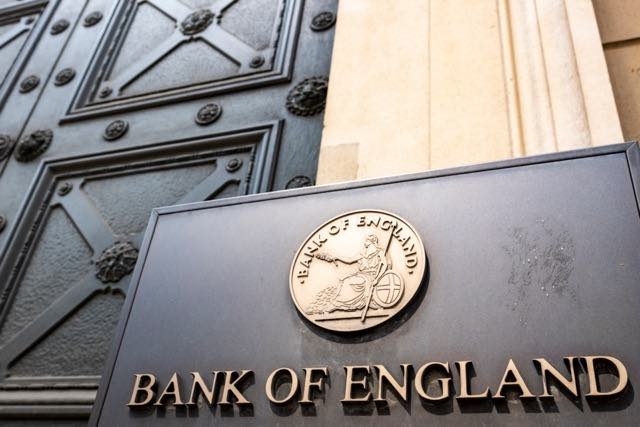The Bank of England's Monetary Policy Committee (MPC) has voted 6-3 to keep the base rate at 4.75% in a widely expected move.
Three members of the MPC wanted a cut to 4.5%, the Bank of England said today.
The decision follows a 0.25 percentage point base rate cut last month.
Sticky inflation issues fuelled the need for the Bank to keep a lid on rising prices.
The move follows a slump in US share prices yesterday after the Federal Reserve cut its key lending rate by 0.25% percentage points to a target range of 4.25% to 4.5% but also signalled a likely slowing down of interest rate cuts next year.
In the UK, CPI inflation spiked upwards this week to 2.6%, the second monthly rise in a row. The Bank reiterated its policy of striving to keep CPI inflation to no higher than 2% over the long term.
At its meeting ending on 18 December 2024, the MPC voted by a majority of 6–3 to maintain Bank Rate at 4.75%. Three members preferred to reduce Bank Rate by 0.25 percentage points, to 4.5%.
In a statement, the MPC said 12 month CPI inflation has increased to 2.6% in November from 1.7% in September "slightly higher than previous expectations, owing in large part to stronger inflation in core goods and food."
Services consumer price inflation has also remained elevated. Headline CPI inflation is expected to continue to rise slightly in the near term.
Although household inflation expectations have largely normalised, some indicators have increased recently, the MPC said.
Most economic indicators of UK near-term activity have declined, the MPC said. Bank staff expect GDP growth to have been weaker at the end of the year than projected in the November Monetary Policy Report.
The Committee said it now judges that the labour market is "broadly in balance." Annual private sector regular average weekly earnings growth picked up quite sharply in the three months to October, but has tended to be more volatile than other wage indicators.
The latest Agents’ intelligence suggests that average pay settlements in 2025 will be within a range of 3% to 4%. There remains significant uncertainty around developments in the labour market.
Monetary policy has been guided by the need to "squeeze" remaining inflationary pressures out of the economy to achieve the 2% target both in a timely manner and on a lasting basis.
The MPC is also monitoring the impact on growth and inflationary pressures from the measures announced in the Autumn Budget, and from geopolitical tensions and trade policy uncertainty. These developments have generated "additional uncertainties" around the economic outlook.
Reaction to the MPC decision was one of little surprise although some remain concerned about inflation.
Simeon Willis, chief investment officer at pension provider XPS Group, said: "The MPC deciding to take it easy on reducing rates isn’t surprising in an environment where inflation is above target and rising.
“Inflation has been picking up over the last six months. This was expected as energy price falls during the latter half of 2023 fell out of the calculation, but recent price rises in October were higher than trend levels. At the other end of the yield curve, longer-dated gilt yields have been rising. Nominal and real gilt yields are now back at levels previously seen at the height of the gilts’ crisis and this years’ Budget. This is generally good news for pension schemes and has boosted funding levels to new highs.”
Rachel Winter, partner at wealth manager Killik & Co, said “Investors and consumers in the UK will be disappointed that the Monetary Policy Committee has not given them a Christmas gift of a final rate cut in their last decision of 2024. The Autumn Budget has proved inflationary, and this means that interest rates will likely need to remain at higher levels to keep this inflation in check."
The next Bank of England base rate decision will be on 6 February.
• This is a breaking news story - check back later for more details and reaction.

